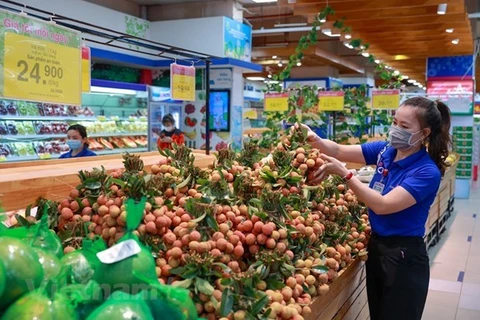Hanoi (VNA) - The estimated sale of Vietnamese cement products reached 70.7 million tonnes in the first eight months of 2021, up 4 percent year-on-year, in which, domestic consumption was about 43.54 million tonnes, down 5 percent, and export volume was 27.23 million tonnes, up 12 percent.
In August alone, the total volume of cement sold was 8.09 million tonnes, down 8 percent against August 2020, of which 4.97 million tonnes was sold in the domestic market and 3.12 million tonnes shipped abroad.
According to Nguyen Quang Cung, Chairman of the Vietnam Cement Association (VNCA), the total volume and value of cement and clinker exports is maintaining at a high increase rate thanks to the growth in the period from January to April, before the fourth wave of COVID-19 broke out.
However, from the end of April, the outbreak of the pandemic has suspended construction projects in Hanoi and Ho Chi Minh City and 19 southern localities, resulting in a decline in demand on cement consumption in the recent months and the following months.
Regarding domestic consumption, the southern region has the strongest increase in consumption in the country with a year-on-year increase rate of 12.2 percent and. Therefore, the prolonged social distancing distance in this region will continue to affect domestic cement consumption significantly.
China, the Philippines and Bangladesh are the largest importers of Vietnam’s cement and clinker./.
In August alone, the total volume of cement sold was 8.09 million tonnes, down 8 percent against August 2020, of which 4.97 million tonnes was sold in the domestic market and 3.12 million tonnes shipped abroad.
According to Nguyen Quang Cung, Chairman of the Vietnam Cement Association (VNCA), the total volume and value of cement and clinker exports is maintaining at a high increase rate thanks to the growth in the period from January to April, before the fourth wave of COVID-19 broke out.
However, from the end of April, the outbreak of the pandemic has suspended construction projects in Hanoi and Ho Chi Minh City and 19 southern localities, resulting in a decline in demand on cement consumption in the recent months and the following months.
Regarding domestic consumption, the southern region has the strongest increase in consumption in the country with a year-on-year increase rate of 12.2 percent and. Therefore, the prolonged social distancing distance in this region will continue to affect domestic cement consumption significantly.
China, the Philippines and Bangladesh are the largest importers of Vietnam’s cement and clinker./.
VNA























